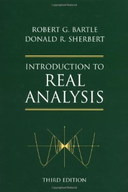If E E M[a, b], we define the (Lebesgue) measure of E to be the number m(E) := J: IE
Chapter 10, Problem 16(choose chapter or problem)
If E E M[a, b], we define the (Lebesgue) measure of E to be the number m(E) := J: IE. Inthis exercise, we develop a number of properties of the measure function m : M[a, b] ~ IR.(a) Showthatm(0) =0 and 0:::: m(E) ::::b - a.(b) Show that m([e, d]) = m([e,d = me, d]) = me, d = d - e.(c) Showthatm(E') = (b - a) - m(E).(d) Show that m(E U F) + m(E n F) = m(E) + m(F).(e) If E n F = 0, show that m(E U F) = m(E) + m(F). (This is the additivity property ofthe measure function.)(f) If (Ek) is an increasing sequence in M[a, b], show that m(U~1 Ek) = limkm(Ek). [Hint:Use the Monotone Convergence Theorem.](g) If (Ck) is a sequence in M[a, b] that is pairwise disjoint (in the sense that Cj n Ck =0whenever j :/=k), show that(18) m( Q Ck) = ~m(ck).(This is the countable additivity property of the measure function.)
Unfortunately, we don't have that question answered yet. But you can get it answered in just 5 hours by Logging in or Becoming a subscriber.
Becoming a subscriber
Or look for another answer
